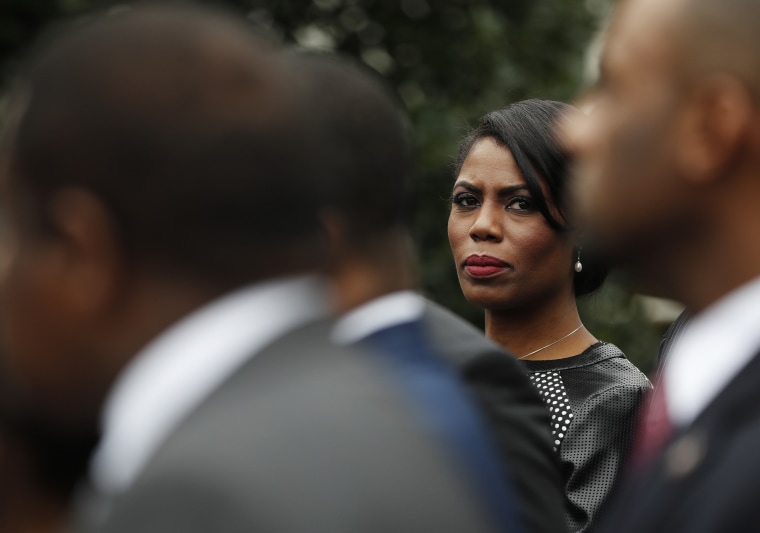Leaks, recordings, hush money, non-disclosure agreements and security clearance complexities have become hallmarks of President Donald Trump’s presidency. What would be in any other White House outrageous breaches seem increasingly common in the West Wing and beyond, clear symptoms of a larger disorder in the national security health of this administration.
Reality-television villain turned White House aid Omarosa Manigault Newman claims she brought a recording device into the White House Situation Room in order to record Chief of Staff John Kelly during her termination. Manigault Newman played the recording on Sunday during “Meet the Press” — undoubtedly leading to a surge in pre-orders for her new tell-all “Unhinged.”
Manigault Newman also recorded a phone call with the president she says took place after her firing. In that recording, played exclusively for the first time Monday on the “Today” show, Trump appears to have no idea Kelly was planning on dismissing her. And the former “Apprentice” star claims she has even more tapes she hasn’t released yet.
She’s not the only one. Michael Cohen, Trump’s personal attorney and sometime “fixer” secretly recorded Trump on at least one occasion — which we know about because it was part of a cache of tapes released to federal investigators as part of Robert Mueller’s probe.
I’ve investigated government leaks as part of my duties as the FBI’s Assistant Director for Counterintelligence. Often, people leak because they feel compelled by a sense of injustice, helplessness, or resentment. Sometimes they are motivated by pure greed. Almost always, they have no trust in their leadership to do the right thing.
Although Trump slammed both Cohen and Manigault Newman for their recordings, the president himself once implied that he might have tapes of his conversations with former FBI Director James Comey, leading the former director to tell Congress: “Lordy, I hope there are tapes.” (Trump later backtracked and said he did not have recordings of Comey.)
Confusion and chaos abound in Trump’s world. But at what cost? Secret recordings by White House staff and others around the president are serious warning signs to those in the counterintelligence community. A well-run national security apparatus is essential to a functioning White House. But these are not the only breaches in security the American public should be worried about.
The White House is hemorrhaging sensitive intelligence from within. Repeatedly, the national media quotes verbatim dialogue gleaned from participants of meetings and discussions inside the Oval Office or West Wing. Often, these leaks contain sensitive and even classified information not intended for public consumption. Such was the case when it was revealed that Trump had potentially disclosed sensitive information about intelligence sharing with Israel during an Oval Office meeting with Russian officials. Trump denied he had done anything improper, but the story got out anyways; Israeli intelligence officials were not happy.
And yet, somehow there’s more.
The White House has allowed dozens or more staffers, in close proximity to the president, to hold Top Secret/Sensitive Compartmented Information (SCI) clearances despite these staffers having only been granted interim clearances. This highly unusual situation is a blatant violation of U.S. government security regulations. It also enabled Rob Porter to continue to serve as White House staff secretary for over a year despite being the subject of multiple, unresolved allegations of domestic abuse.
Similarly, the president’s own son-in-law, Jared Kushner, maintained the highest levels of clearance with only an interim clearance for the first year of the Trump administration. Kushner has recently received permanent clearance status but, according to Washington Post sources, no longer has the highest clearance level. The Post notes that while the reason for this is unclear, it could be related to the fact that Kushner’s foreign entanglements are still being examined by the special counsel.
The situation has gotten so bad, that it’s possible White House staffers are being offered large monthly payouts to keep quiet. Manigault Newman claims that she was offered such a payout, leading Kellyanne Conway to counter that White House staffers are required to signed nondisclosure agreements. There is reason to believe presidential NDAs are unconstitutional, but regardless, the idea that the president would demand them betrays a distressingly low level of trust between the commander-in-chief and his staff. What kinds of information does Trump believe staffers will be unable to keep to themselves? And why does he think they will feel compelled to share it?
When it comes to national security, “the fish rots from the head down.” The president entered the White House with a reputation for recording conversations, using information as a weapon and demanding loyalty at all costs. This approach may have served him well in business, but it won’t keep our nation or this White House free from vulnerability. And exploiting vulnerabilities is exactly how foreign intelligence services or other bad actors worm their way into the White House.
Maybe Omarosa has even more salacious information to leak — or maybe she doesn’t. But either way, her revelations this week should be viewed as a symptom of something much more concerning going on in the Trump White House.
C. Frank Figliuzzi is the former Assistant Director for Counterintelligence at the Federal Bureau of Investigation. Before that, he served as the FBI's Chief Inspector. He currently is the chief operating officer of ETS Risk Management, Inc. and a national security contributor for NBC News.


